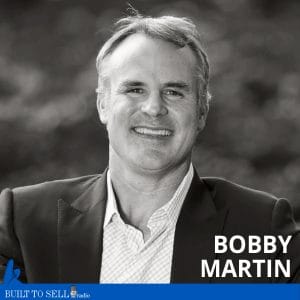About this episode
Bobby Martin had built First Research up to $6.5 million dollars in revenue when he sold the business to a Fortune 500 company for 26 million dollars.
To read a transcript of this episode, click here.
Despite getting four times revenue for his business, Martin ended up feeling empty after the sale….
In this week’s episode of Built to Sell Radio, I interview Bobby Martin. Bobby built his business from the ground up and had a great exit. He sold his business to a Fortune 500 company for $26 million dollars – four times his top line revenue at the time.
Martin’s exit was a financial success but life after the sale took a big turn for the worse.

About Our Guest
Bobby Martin is the founder of The Hockey Stick Principles, a research project to figure out how good ideas become successful firms; and he is the president and co-founder of Vertical IQ, a leading provider of sales research insight for banks. Martin also co-founded and served as president of First Research, a leader in sales intelligence. In 2007, First Research was sold to D&B Corporation. Today Martin is an active angel investor and serves as an active board member with innovative start-ups Local Eye Site, Boardroom Insiders, LifeSite Logics, and etailinsights.


